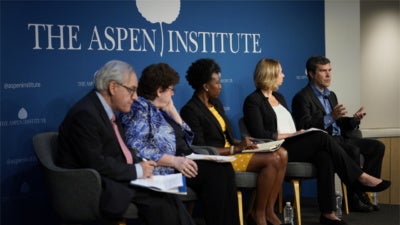Although unemployment in America is at a near-historic low, the wealth gap keeps growing. It seems that even though many people have jobs, their jobs simply aren’t giving them what they need in terms of long-term financial security, good benefits, and potential for growth. What will it take to make sure everyone in America has a high-quality job?

Panelists speak at “How Do We Create More Quality Jobs?” (Left to right: E.J. Dionne, Demetra Nightingale, Caryn York, Amanda Blondeau, Rick Plympton)
In an event hosted on June 13 by the Aspen Institute Economic Opportunities Program (EOP) and the Urban Institute, speakers provided their answers to that question. The event (Quality Jobs for All: What Would It Take?) was a part of Working in America, a series of discussions hosted by EOP to address the issues that face low- and moderate-income Americans and to discuss ideas for expanding economic opportunities for working people. Speaking on the panel were Amanda Blondeau, Business Services Director of Northern Initiatives, Demetra Nightingale, an Institute Fellow at the Urban Institute, Rick Plympton, CEO of Optimax Systems, and Caryn York, Executive Director of the Job Opportunities Task Force. The conversation was moderated by E.J. Dionne, from the Washington Post. Together, the panelists determined a set of directives for policymakers, business owners, and consumers for how we can help lead the way toward a future with quality jobs for all.
Institute better paid leave policies
The first concrete objective speakers agreed on was one that’s been the subject of many conversations about job quality recently: expanding paid leave. Too often, workers are put in the position of having to choose between prioritizing taking care of themselves or loved ones and prioritizing their jobs. No one should have to choose between their health and their livelihood.
“No one knows when they’re going to get sick, and you never know how long you’re going to be sick for,” Caryn York said. “But your paycheck or your job security should not be jeopardized by something that’s going to happen to anyone.”
Rick Plympton echoed this sentiment, and shared the policy that he has instituted at Optimax: “We created a policy where if an employee needs to take time off to help a parent or sick child, other employees can donate personal time off to that employee so that they can take extended time away from work and not miss out on their paycheck.” Demetra Nightingale pointed to better paid leave policies as one of the areas in which the United States should take lessons from the international business community.
Better and more accessible benefits
Speakers agreed that workers need better job benefits, and that more workers need to be considered eligible for said benefits. “Employers are providing jobs [that] are lacking in terms of providing the right benefits, of making sure that there’s health insurance, retirement, emergency savings products, college emergency assistance, and more,” said Sarah Keh, Vice President of Corporate Social Responsibility at Prudential Financial, who gave the opening remarks at the event.
Nightingale added that, as the kind of work people are able to get changes, their relationship with their employer changes as well. “There’s been a change in the nature of work and the arrangements between workers and employers, and the shift that we’ve seen is likely to continue,” she said. “There’s no longer the same kind of relationship between employers and employees as there are more contractors, there are more so-called gig workers, there’s more franchising, more contracting out.” There needs to be a change in how we determine what benefits workers are given, and in how we determine what workers are eligible to receive these benefits to begin with.
Eliminate education and employment barriers
Of course, a necessary prerequisite to being able to get a job with good benefits is being able to get a job at all, and for a lot of people there are insurmountable financial or structural barriers standing between them and quality employment. In the US, going to college is often considered to be a direct pipeline to a good quality job. But college itself can be difficult to access. “We may think that access to education is available to everyone but it’s not, because there are certain constituencies that it’s not so easy to access education for,” York said. “[Two things I would push for] that focus on education and access to affordable education is investing in more in adult education and skills training and the like — and we also have to talk about college affordability, and I’m not just talking about four-year college. Some people cannot afford to access community college.”
In addition to inaccessibility of education, there are other structurally embedded roadblocks to quality jobs that individuals may face depending on their circumstances. “You can’t talk about job quality without talking about access, because certain folks are only going to be able to access certain jobs because of who they are or what they look like or where they were born,” York said. Formerly incarcerated individuals, for example, are released into a system that sets obstacle after obstacle in the middle of their path to a successful reentry into society. The 1996 Welfare Reform Act stipulated that if a person had been charged with a felony drug possession, upon their release from prison, they were ineligible for services like food stamps or temporary cash assistance, which are designed to help people get back on their feet when they need to most. York also called for access to Pell grants for incarcerated individuals, the elimination of a question on college applications asking applicants whether or not they’ve been incarcerated, and for loosening the criteria for occupational licenses in order to allow formerly incarcerated people the ability to obtain the licenses they need to work in certain jobs that require them.
Businesses should invest in workforce development
Another area where businesses can improve the quality of the jobs they offer their employees is education and training. Employers have reduced the extent to which they invest in their workers and give them the opportunity to grow. In order to gain the skills needed to adapt to a changing workplace, employees need opportunities to learn and develop their abilities. These opportunities should be accessible in their workplaces, so that workers are able to grow within their jobs instead of having to leave their jobs and seek their training elsewhere. “We need to shift the paradigm so that work itself is a continuous learning environment,” Nightingale said. “If it’s a continuous part of the culture, it’s not a shock to the system that requires you to stop a job and go back to school, you’re already learning the skills as you go along.”
Plympton noted that Optimax continually trains every employee that they hire, and that they create spaces in the workplace where employees can learn from one another every week. “In regard to workforce development, we have a belief that if we train people properly, they’ll be able to create higher value,” he said. Optimax offers $5,000 to every employee each year for education and creates learning plans for employees to help them grow.
For consumers: shop local
For people who do not own businesses or work on public policy, there are not very many ways to help improve someone else’s job quality. But we do have one option: We can support small, local businesses. Amanda Blondeau explained that in her experience working with small business owners in Michigan’s Upper Peninsula, most of her clients want to be able to provide their employees with good benefits and opportunities to grow — but don’t always have the revenue to support those efforts. As consumers, we can use our money to support businesses working to improve the lives of their employees. “If you spend $100 at a locally owned business, $68 stays within that community,” Blondeau said. “If you spend $100 at a non-locally owned business, $43 [stays]. If local businesses are making more money, they can provide benefits to their employees too.”
Share
Tweet While many people are working, too many jobs fail to offer financial security, good benefits, and potential for growth. What will it take to ensure everyone in America has a high-quality job?
Tweet How can we create more quality jobs? 1. Institute better paid leave policies. 2. Eliminate education and employment barriers. 3. Businesses: invest in workforce development. 4. Consumers: shop local.
Tweet As consumers, we can use our money to support businesses working to improve the lives of their employees. What else can we do to create more quality jobs?
Keep in touch
Learn how the Economic Opportunities Program is helping low- and moderate-income Americans connect to and thrive in a changing economy. Follow us on social media and join our mailing list to stay up-to-date on publications, blog posts, and other announcements.


